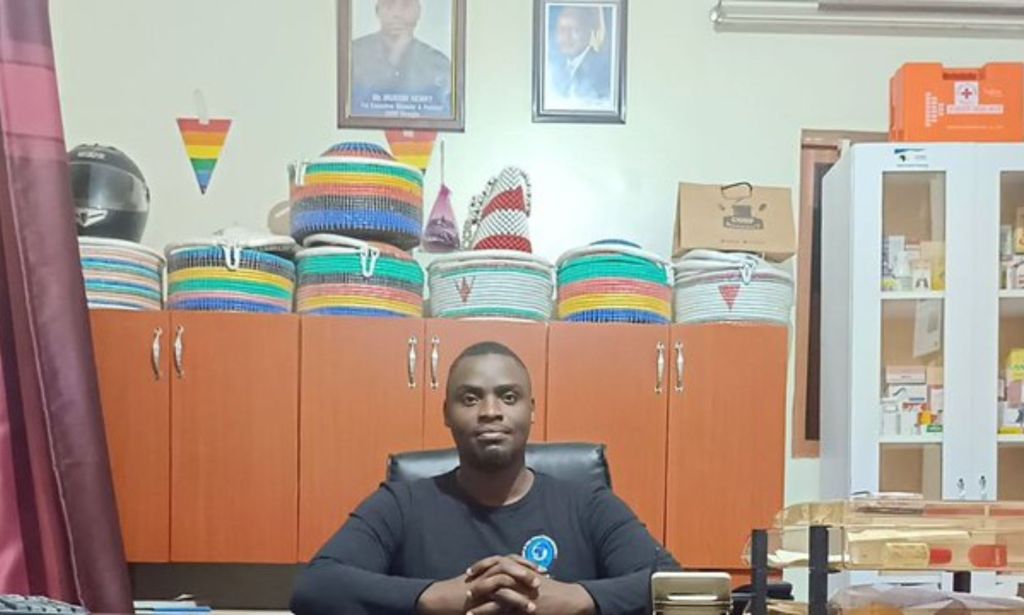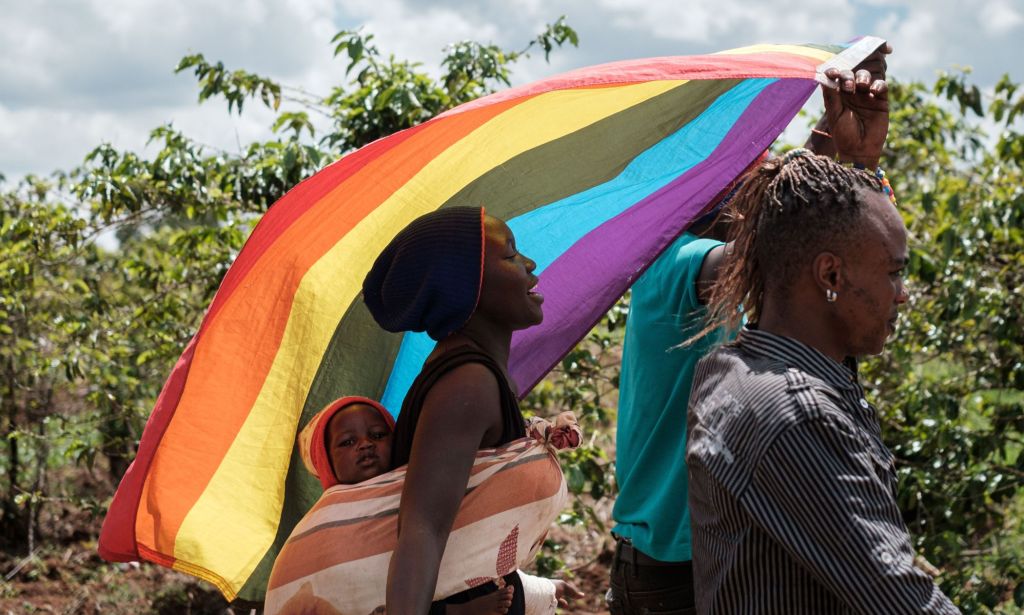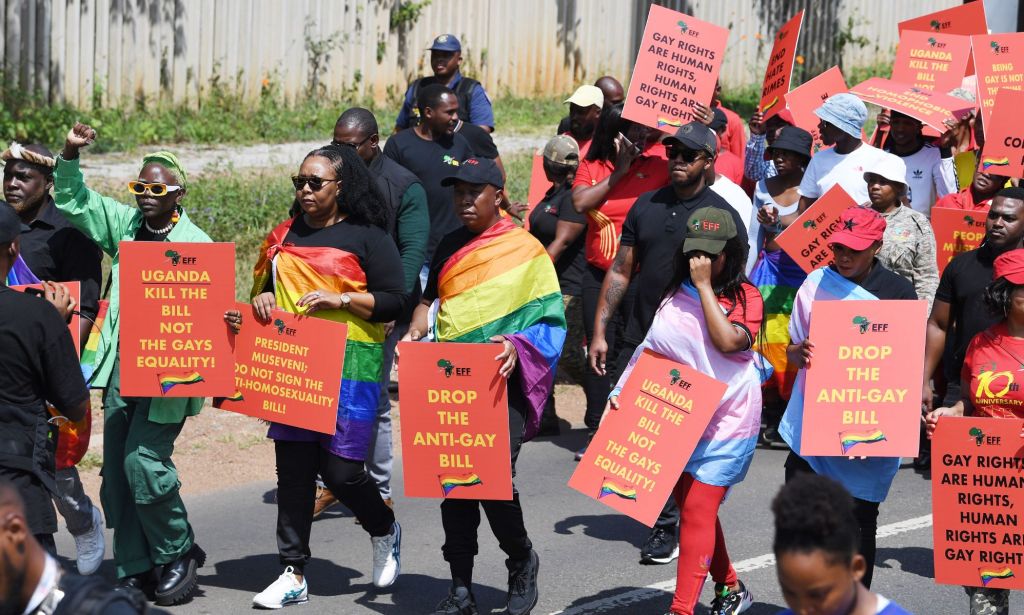When he made the tough choice to flee Uganda, in the wake of the country’s draconian anti-LGBTQ+ law being passed, activist Henry Mukiibi thought: “What have I left behind?”
Mukiibi, the executive director of LGBTQ+ group Uganda’s Children of the Sun Foundation (COSF), has been on the run and living in the Kenyan capital, Nairobi, since earlier this year, after receiving information that the authorities at home wanted to arrest him under the new anti-homosexuality legislation.
The Anti-Homosexuality Act, which was enacted in May and carries the death penalty for certain same-sex acts, has unleashed a torrent of abuse against LGBTQ+ people in the country. Several queer individuals have been arrested. Others, including Mukiibi, managed to escape as their government enacted one of the harshest anti-LGBTQ+ laws in the world.
Mukiibi tells PinkNews that the situation in Uganda is worse than it has ever been.
COSF’s services, which provide healthcare and legal assistance as well as shelter for vulnerable people, including members of the LGBTQ+ community, have been affected by the legislation.
Mukiibi says he witnessed people become “so homophobic” that they “started attacking” COSF committee members, “beating them because of who they are”.
He adds: “What we did was ask the people who are close to them to bring them to the clinic, and we are giving them healthcare services to see that they get treatment.
“Evictions have become too many because the bill had a phrase which said landlords should not give LGBT people shelter or houses to rent. Many people were evicted.
“Those whose landlords knew their identities, they were evicted because the landlords fear they will also be taken to prison.
“We welcomed those people into our shelter, but unfortunately, our shelter’s landlord wrote me an eviction letter since they know I’m a queer person.”

Under Uganda’s Anti-Homosexuality Act, queer people can face life imprisonment or even the death penalty in cases involving so-called “aggravated homosexuality”, which can include having sex with a minor or vulnerable person, having sex while HIV-positive or engaging in incest.
Someone simply advocating for LGBTQ+ rights could be jailed for 20 years, and individuals renting to LGBTQ+ people face up to a seven-year prison sentence.
Mukiibi says life is really hard in Nairobi as he waits to be resettled in another country. While fearing for his own safety, he still thinks about the LGBTQ+ community trying to survive in Uganda.
“If I’m evacuated, what am I leaving behind?” he asks. “They have this saying: ‘I cannot be a hero twice’.
“I’m also trying to see that we are working remotely so our community members get the services they need. The reason I came up with the idea of the clinic was that sometimes the LGBT community are discriminated against in facilities, and I recently witnessed it.
“People went [to] healthcare providers who are preaching to them to beat homosexuality out of children.”
Even before the Anti-Homosexuality Act was passed this year, LGBTQ+ people faced severe discrimination in Uganda
Uganda was already one of several African nations where it’s illegal to be queer and enacted a previous anti-homosexuality act in 2014. The courts struck it down, although being LGBTQ+ remained illegal because of previous legislation, according to Human Rights Watch.
Anti-LGBTQ+ sentiment has been rife in the East African nation, with president Yoweri Museveni describing queer people as “deviants”, and government officials attacking queer-focused groups.
Police used COVID-19 as a pretence to raid COSF’s facilities for the LGBTQ+ community, accusing residents of breaking social-distancing regulations.
Many in the Ugandan LGBTQ+ community have sought safety in Kenya, only to find they face discrimination there too.
Dhalie Bulyaba, the director of Safe Place International’s global family initiative, decided to leave Uganda and go to Kenya because they “wanted to find a place that wouldn’t question [them] about the way [they] dress, or ask for an explanation about how [they] identify”.
But they realised that seeking asylum and appealing to authorities “forces outings” of LGBTQ+ people.
“Kenya has one of the largest refugee populations in Africa,” Bulyaba says. “They receive a lot of people from Somalia, Sudan, the [Democratic Republic of the] Congo and other war-torn areas, so when you say you are coming from Uganda, they are confused.
“They will ask: ‘Why are you here? There is no war in Uganda’. You are forced to out yourself and hope for their mercy because Kenya also criminalises homosexuality.
“It’s hard enough to fight for your rights in your own country.”

LGBTQ+ people are criminalised in Kenya, and same-sex sexual activity between males carries a maximum penalty of 14 years’ imprisonment.
In September, hundreds of anti-LGBTQ+ protestors rallied outside the country’s Supreme Court to protest against its decision to reaffirm the queer community’s right of association and to form non-governmental organisations.
Bulyaba loves “trying to think through big-picture issues and driving systemic change”, and they are as passionate about reading and cooking as they are about advocacy.
“There is always time in my day to meet for coffee and call out these politicians and the systems they are trying to push,” they add.
They also point out that the persecution of African LGBTQ+ people doesn’t come solely from conservative forces on the continent – UK and US groups are behind some of it.
‘We could have prevented LGBTQ+ people being forced to flee Uganda‘
US-based Christian groups – known for fighting everything from reproductive rights to the freedoms of LGBTQ+ people – have invested heavily across Africa over the past decade, pushing a strictly conservative agenda.
In April, a damning report revealed the UK government funded the work of a virulently anti-LGBTQ+ religious organisation in Uganda, according to VICE.
The World Bank has already stopped lending to Uganda, and the European Union has denounced the most recent anti-LGBTQ+ legislation.

Sulah Mawejje, Safe Place International Dream Academy Kenya country director, says the World Bank and other organisations “need to be more proactive and less reactive” because they know the anti-LGBTQ+ movements in Africa are being funded by foreign organisations.
“Why have they waited for something like this anti-gay bill to pass before they impose sanctions and try to stand up to the government?” he asks.
“We could have prevented people being forced to flee and being forced to go through the very difficult process of becoming a refugee.”
Mawejje, a part-time interpreter for the United Nations High Commission for Refugees, adds that he’s “much more than a refugee, a person who has faced unspeakable discrimination” while fleeing Uganda.
“There is another side to me, like many refugees, that the media doesn’t get to, I’m the life of the party,” he says. “I love being bold and challenging.”
